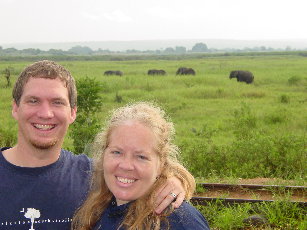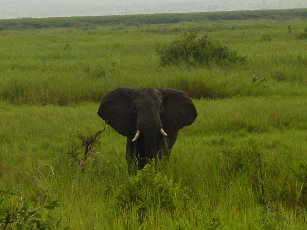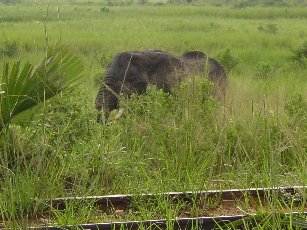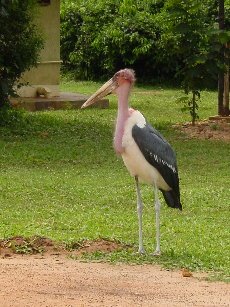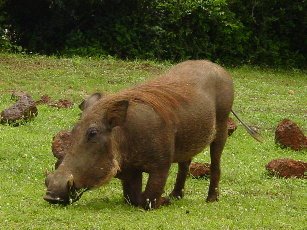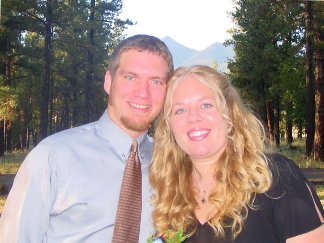Nebbi Visit
We have made several visits to the field recently to see the work that is going on in Nebbi Diocese. At one stop we met with members from the Kaya and also the Maliri community groups. Together, Kaya and Maliri have 318 members, each of them participating in one or more of four group projects. Below is a brief summary of the projects the groups have been focusing on during their young history. In the coming year, the groups plan to add a kitchen garden, or horticultural, project to their list of activities. Kitchen gardens make it easier to cook healthier meals for the family. Excess vegetables can also be sold for a profit at the local market.
a. Goat Multiplication
In a goat multiplication scheme, certain members of the group are given “starter” goats. The stipulation for those receiving a starter goat is that the first offspring will be passed on to a member that does not have a goat yet. Other offspring after that may be kept, eaten, or sold. This is a popular project, as goats are an important part of life here in Uganda.
b. Poultry Multiplication
Poultry projects function in the same manner as the goat multiplication schemes. Eggs and chicks laid by the starter chickens donated by the DPDC result in better nutrition for each group member’s family if eaten, or more income to send children to school, buy materials for a permanent house, etc.
c. Malaria Prevention
Participants in malaria prevention projects are required to participate in trainings on malaria, its causes and effects. Oftentimes, simple changes in lifestyle (such as getting rid of any receptacles with stagnated water which mosquitoes like for breeding) can make an impact on the number of times your child gets sick. Successful participants are also given treated mosquito nets at reduced prices. Combined, the training and the nets have been having a real effect on malaria incidence.
d. Adult Literacy
Adult literacy participants take weekly classes in literacy with an adult literacy trainer. The classes are often functional and serve multiple purposes. On the one hand they teach the basics of reading, writing, and math so that adults can succeed better in life and work. At the same time, the lessons often incorporate such information as proper sanitation techniques, etc. Adult literacy groups often bond and start their own income generating projects.
TESTIMONY TIME
During our visit, several members stood up to give testimonies about how the group projects that have had an impact on their lives. These are all products of the support that CRWRC is indirectly providing via the Deanery Planning and Development Committee (DPDC) of the Church of Uganda (COU). Here are some of the comments that were made…
“I can remember a time when one of my students in the Adult Literacy program took her child to be vaccinated. She had brought what she thought was the correct documentation that she needed. It turns out that she had grabbed the wrong forms. Now, with her ability to read, she won’t make such mistakes.”
“When my husband died, I was left caring for our six children. I heard about this widow’s association and thought that it might be able to help. I was taught how to take care of a goat and then given one of my own. Since then I have had seven goats, I have been able to use them to pay for school fees, buy my children clothes, and get them medicine when they are sick.”
“I was taught mosquito control methods such as using a drying rack. With less standing water around the house, there are fewer mosquitoes, therefore, my children don’t get malaria as frequently. Not having to go to the clinic for malaria medicine has improved our household income.”
“Since being elected as a leader of Kaya, I have become more confident in myself and my leadership skills have greatly improved.”
“I am proud of myself because I can now read my own letters and go to the market and count money without any problem. It has made me happy to not to rely on others for these things.”
STORY TIME
Now we know that we have you do this a lot, but imagine that today is your thirtieth birthday. You are a woman with 5 children living in a rural village in Padyere. Two other children died at a young age. Life has been a constant struggle with no reason to believe that it will ever be any better. When you were five, you started helping care for other babies in the family. By age 8, you walked over two miles per day carrying water cans balanced on your head from the closest borehole. Because there was only enough money to send your brothers to school and education was not highly valued for females, you had to leave school at age 10. You are considered wealth for the family because when you marry, your family will receive a dowry. However, until you marry, you are considered an expense to the family. Because of this, you are encouraged to marry young. By age 15 you are married. By age 16, you have your first child. You are now responsible for most of the work in the household and in the field. When you were 27, you heard about a women’s Christian association that was forming to do adult literacy classes. While you knew that it would mean more work, you decided to join. Although it wasn’t easy, the solidarity of the group boosted your confidence; their encouragement pushed you to progress further in your studies. Today, on your birthday, you have just graduated to level 4 literacy classes. As an individual you are more confident; as a mother, you can support your children better in their studies; as the family provider, you can manage the family finances better; as a group member, you are now a leader; as a community member, you now are more confident to voice your opinions; as a Christian, you now believe that God cares about all aspects of your life. While you know that there will still be great challenges in the years ahead, you will always be able to look back at your thirtieth birthday with pride and believe that you are capable of making positive changes.
Ultimately this is not just a story about one woman, but the story of many women across Uganda and Africa. We hope that you will take time today to reflect on the challenges faced by people around the globe and consider how your prayers and support can contribute to a person’s transformation.
